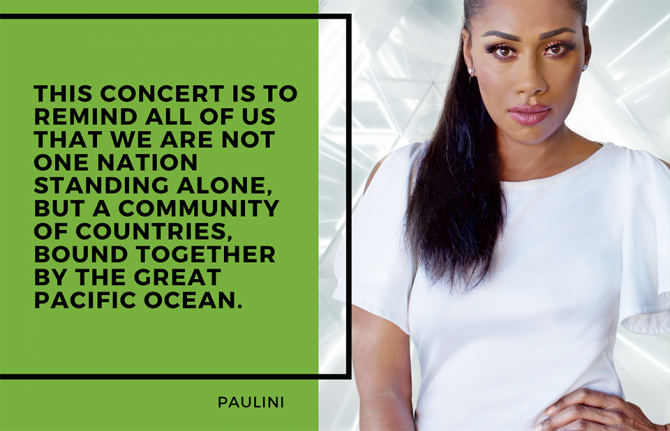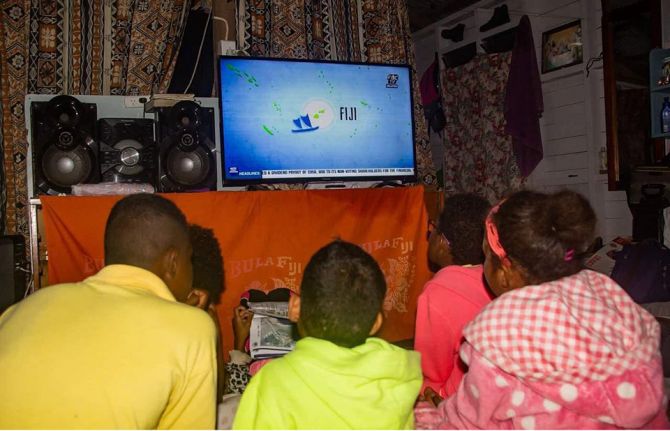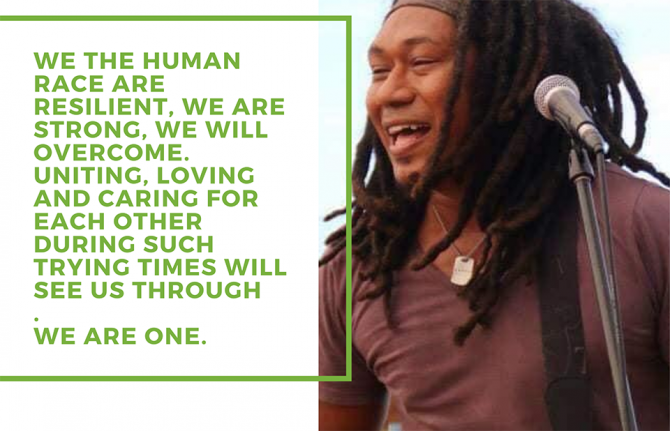




Feature Story
Pacific Unite concert promotes solidarity during the COVID-19 pandemic
16 September 2020
16 September 2020 16 September 2020Broderick Mervyn and his colleagues huddled around a computer, curiosity giving way to pride, as they tuned in to the Pacific region’s first-ever virtual concert.
“I’m from Rotuma Island, a lesser known island of Fiji, and when I saw a Rotuman group perform, there was a sense of pride, admiration and patriotism of not only our country but our culture,” said Mr Mervyn, Coordinator and Founder of Ignite4Change, an organization that advocates for political participation by vulnerable groups.
Mr Mervyn’s sentiments were shared by fellow Pacific islanders and diaspora. At a time of isolation, when many are missing their family due to closed borders or feeling alone, listening to songs of hope performed by dozens of notable musicians and emerging, homegrown artists brought reassurance. The concert, Pacific Unite: Saving Lives Together, was organized by the United Nations in collaboration with community partners intent on bringing communities together in the time of COVID-19 in order to foster solidarity, pay tribute to essential workers and encourage everyone to play their part in preventing the spread of the epidemic.
The concert featured supportive messages from leaders and influencers, including Prince Charles, Fijian Prime Minister Frank Bainimarama and New Zealand’s Prime Minister, Jacinda Ardern, and showcased the region’s vibrant cultures.
“It was educational just as it was entertaining—we got to see and hear from other Pacific islands,” said Foto Ledua, a station manager of Buzz FM in Vanuatu. “As a whole, it is such a great promotion for the Pacific and showed how diverse our cultures are, how rich our music is and how incredibly talented our people are.”
Ms Ledua spoke about the changes brought by COVID-19, including the economic crisis from decreased tourism and the losses that artists face without live concerts to perform at. She said that, “At a time like this, when people can’t travel out of their countries, or even their cities, having a concert brought into your living room is really uplifting.” The concert was broadcasted on television and radio in 13 Pacific countries, Australia and New Zealand and has reached nearly 75 000 views on the United Nations YouTube and Facebook platforms.
Ms Ledua observed that among those watching the event with her, the concert sparked conversations about the impact of COVID-19, as well as climate change, economic recession and other issues facing the people of the Pacific. Reflecting on the response to COVID-19, she said, “In our diversity, we are the same—we may be from different islands, different countries, but we all face the same problems here in the Pacific. We've been through difficult periods in our history, and we survived. We can get through this if we all work together.”
The Speaker of Parliament of Fiji and UNAIDS Regional Goodwill Ambassador for Asia and the Pacific, Ratu Epeli Nailatikau, expressed a similar view on the need to come together to combat the spread of COVID-19. “There are those with no safety net to fall back on … until we beat COVID-19, and hopefully nurse our economies back to normal, we need to act together to slow the spread of the virus and look after each other,” he said.
As the first virtual concert in the region, Pacific Unite brought the people of the Pacific together, reaffirming their shared culture and resilience, and also highlighted the critical role that UNAIDS can play in coordinating the COVID-19 response. Across countries, UNAIDS country directors have led or supported efforts in ensuring that United Nations staff and their dependents have access to the latest COVID-19 information, treatment, care and support. UNAIDS staff have the specialized experience of responding to health crises and building the capacity of communities to prevent the spread of epidemics. The Pacific is no different, where Renata Ram, the UNAIDS Country Director for Fiji and the Pacific and Chair of the United Nations Communications Group for the Pacific, led the charge to mobilize United Nations agencies and community partners and to guide the planning and execution of the concert.
“I accepted the United Nations Resident Coordinator’s proposal to organize the concert, recognizing that it must be for the Pacific, by the Pacific. The soul of the concert were the stories told by communities on how they are coping in a COVID-19 world. These stories and the concert itself speak to the driving force of UNAIDS—the power of communities,” said Ms Ram.
An isolated region, the Pacific is not always afforded the opportunity to be heard on the global stage. Ms Ram spoke about the impact of the virtual concert, stating, “We have unlocked a new communication tool through which voices from the Pacific can be heard. Too often our voices are drowned out due to our small numbers, too often we have been left behind.”
The Pacific Unite virtual concert reveals new possibilities for connection and action and exemplifies how the United Nations can mobilize with artists, community partners and governments to innovatively face the challenges at present and in the future.
Our work
Region/country
- Asia and Pacific
- Australia
- Bangladesh
- Bhutan
- Brunei Darussalam
- Cambodia
- China
- Democratic People's Republic of Korea
- Federated States of Micronesia
- Fiji
- India
- Indonesia
- Islamic Republic of Iran
- Japan
- Kiribati
- Lao People's Democratic Republic
- Malaysia
- Maldives
- Marshall Islands
- Mongolia
- Myanmar
- Nauru
- Nepal
- New Zealand
- Pakistan
- Palau
- Papua New Guinea
- Philippines
- Republic of Korea
- Singapore
- Solomon Islands
- Sri Lanka
- Thailand
- Timor-Leste
- Tonga
- Tuvalu
- Vanuatu
- Viet Nam
- Samoa



